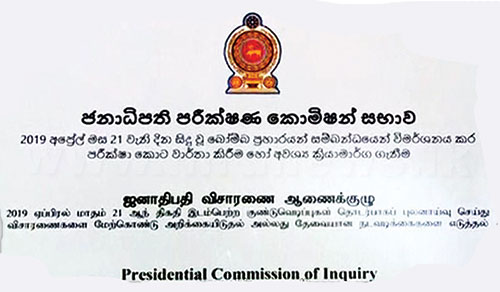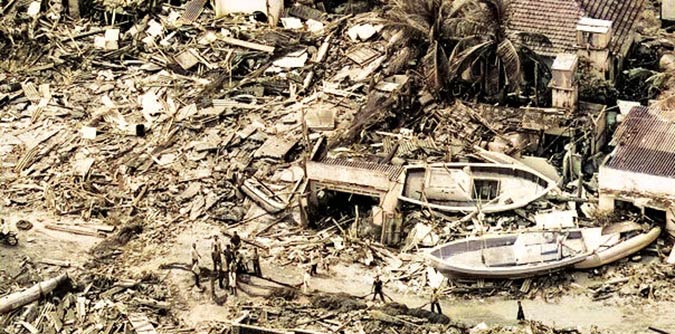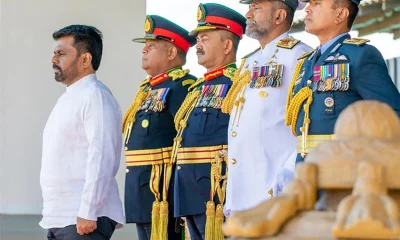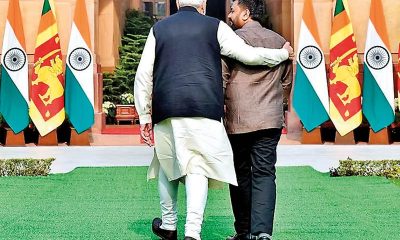Opinion
Only Committees and Commissions, NO RESULTS

During the Yahapalanya Government, Sri Lanka suffered multiple scandals involving both the public and private sectors with colourful individuals playing their roles to perfection in the political theatre of the absurd. As we know, the former President and Prime Minister were famous for their love of committees and commissions to investigate allegations of corruption or mismanagement of funds. Sometimes this is done with the best of intentions, yet it is regretful that the majority of the reports of these committees and commissions do not show any meaningful results. After much time and public resources spent, the reports simply wither away with the public none the wiser and without the country benefiting.
A Dereliction of Duty
The Easter attacks left hundreds dead, many more injured, and the economy devastated with the crucial tourism industry halted, due to the complete negligence of officials at every level in the national security apparatus. All this was in the immediate lead up to the Easter Bombings. However if we look back further, we will observe even more startling revelations.
An arrest warrant against the main perpetrator was issued as far back as 2018 but never followed through. Indian intelligence services had provided atleast three warnings, including one on the eve of the attack with specific information regarding the sites predicted for an attack.
As far back as 2016, the Muslim Council of Sri Lanka filed police complaints, alleging that the “National Thaweed Jamat” (NTJ) was preaching violence and extremism. These complaints were not followed up adequately. In January 2019, 100 kilograms of explosives and 100 detonators were found near the Wilpattu National Park. The police even stated that they belonged to an Islamist group. The detonation of explosives in a motorbike during a lightning storm, also in the East of the country, should have provided further clues that something was brewing in the East. Yet there was no prior warning, the public was never made aware of the danger posed. The level of gross negligence in these matters is astonishing, and surely there should be manslaughter charges brought against officials that failed our country.
The writing was very much on the wall leading up to the Easter Sunday attacks. Successive officials representing the Central Government in the Eastern province had been virtually asleep at the wheel while a dangerous and extremist ideology was being spread. The NTJ held meetings and prayer services, attacked and threatened citizens and rival mosques and moderate muslim leaders. Foreign money from dubious sources flowed into the provincial coffers in the form of charity and grants. The Justice Minister at the time stated that foreign forces were trying to infiltrate and radicalize muslim citizens in Sri Lanka, particularly in the east. Information regarding foreign elements connected to the Islamic State (ISIS) was available to the security apparatus. Still – authorities that should have acted promptly were in a deep slumber – astounding!
During the Parliamentary Select Committee proceedings, a witness produced several Islamic textbooks and Islamic teaching materials published by the Department of Educational Publications stating that the Islamic punishment for apostasy (renouncing religion) was death. The material in these books was being taught even to children in Grade 9 and these books were first published in 1982 and republished in 1984 and 2017! It beggars belief that no one had seen this coming.
The Prime Minister had the gall to state that he was not being invited to security briefings, that he was willfully kept out of the loop and did not take any responsibility. Surely the PM should have taken this up immediately. The fact he did not shows a complete lack of interest in national security affairs and thus we can start to imagine how such a catastrophe was allowed to occur.
Sri Lankans watched on, bewildered at the lack of foresight and action from officials at every level of the government and the security and intelligence apparatus. Since the attack, we have witnessed a myriad of theories and accusations levelled at any and all members of the previous regime as well as the current regime. Senior MPs and politicians stated that they had not received the intelligence memos. Police officials and intelligence officers stated that the recommendations of their investigations were not followed through. What did the government do next? You can probably guess. Numerous investigations through Committees! Including a Presidential Commission of Inquiry and a Parliamentary Select Committee. A convenient and often used tool to brush serious lapses aside.
A Family Bond at the Central Bank
Imagine basing an entire presidential campaign on the promise of eliminating corruption and bringing legal action against thieving government officials. Then being embroiled in a classic case of insider trading within two months of winning said campaign. The Yahapalanaya Government had a sense of irony if little else. In what has to be considered the most poorly planned and executed case of insider trading, between family members no less, the UNP-SLFP government of 2015 was over before it had begun.
As a banker I am well aware of the many restrictions in place to prevent insider trading and other forms of fraud at financial institutions. The fact that, as the regulator, the CBSL is directly responsible for compliance and yet found itself caught up in such flagrant and criminal behavior is scarcely believable and totally unacceptable.
If you are going to engage in criminal activity you may want to at least seek to cover your tracks and make it a little challenging for the authorities to investigate. Alas, using the then CBSL Governor’s son-in-law’s company to carry out the transaction was not the work of a criminal mastermind. During the recent General Election, the former Prime Minister claimed that there was no material loss to the country despite the protests of many experts and in spite of the 2016 Report from the Committee on Public Enterprises (COPE). Of course, the former PM is famous for forming numerous committees and commissions to buy time and sweep issues under the proverbial carpet. The CBSL bond scam was the start of a long list of commissions and committees, assembled at a high cost to the tax payer, and with no results to speak of.
Aside from the obvious financial implications, this blatant act of corruption, which the COPE report suggests had been carrying on for some time before the Yahapalanaya Government, had dire effects for the country’s image. Successive governments have tried every which way possible to attract FDI to our country. Considering the Chinese Communist Party’s (CCP) interest in Sri Lanka, attracting FDI should not be so difficult. Numerous tax holidays, promises of ‘one-stop shops’, easing restrictions on foreign ownership of land and even relaxing the rules on foreign exchange brought in to Sri Lanka has not had a significant impact on the levels of FDI.
Perhaps a simple process of getting our house in order might help more than convoluted tax structures. A foreign investor that pays any attention at all, would be shocked to hear that the Governor of the Central Bank was being put under investigation. Further still, the fact that this official was a close friend of the sitting PM, was handpicked by him and is now hiding in Singapore, would send any potential investor running for the hills.
The economic minds in the current cabinet and hopefully beyond must surely realize that financial governance and rule of law are two absolutely non-negotiable pre-requisites for any investment decision.
The Citizenry holds its collective breath….
The aforementioned commissions and committees spend large sums of money and meander through its processes and procedures. All the while, Sri Lankan citizens, who must collectively carry the burden of the financial damage, await real progress and appropriate punishments for those found guilty and the implementation of suitable laws to prevent recurrence.
The recent explosion at the port of Beirut in Lebanon shows what can happen when the state machinery fails in its basic duties. We cannot afford to have state officials exist in a state of hibernation while the wheels are left to turn. The previous administration made a mockery of its own ‘Yahapalanaya’ manifesto, simply kicking the can down the road and hoping that no one notices. Certainly, the Sri Lankan electorate did notice, judging by the complete decimation of the UNP at the 2020 polls.
The People deserve better than this. The current President and Prime Minister have received a clear mandate, they are considered to be people of action, of providing results. I implore them to take the above matters to heart and seriously consider how we approach the next phase of our country’s development. When the state makes miscalculations of such magnitude, when there is a lack of due diligence in decision making, when there are no consequences faced for inaction, the country and its people become the ultimate losers.
Even as recently as this past week, we saw the PCoI on the Easter Sunday attacks once again ask the former President Maithripala Sirisena to visit its offices to provide yet more testimony. On the 17th of August the entire country was plunged into darkness due an issue at the power station and what was the response of the newly appointed Minister of Power? He has appointed a ‘special committee’ to look into the matter.
I urge the print media to periodically devote a special page or even a separate supplement to show the progress of the investigations of the various committees and commissions. In these pages, the mainstream media must make a list of all the commissions currently active as well as those that have completed their investigations. The reports submitted should be regularly summarized in print so that the public can stay informed. The media and the public must maintain pressure throughout so that we do not simply move from one controversy to another. Why should the proceedings of these committees be held in private, why can they not be televised so that the tax payer can hear the testimonies and study the evidence for themselves? The media must ensure that it does its duty as part of this democracy.
Rienzie Wijetilleke & Kusum Wijetilleke
Colombo 7
Opinion
Boxing day tsunami:Unforgettable experience

The first and only tsunami that Sri Lanka experienced was on Boxing Day(26th) of December 2004. My wife and I, as usual, went down to Modara in Moratuwa to purchase our seafood requirements of seafood from our familiar fishmonger, Siltin, from whom we had been buying fish for a long time. Sometimes we used to take a couple of friends of ours. But on this day, it was only both of us that went on this trip.
We made our purchases and were returning home and when we came up to the Dehiwala bridge, many people were looking down at the canal from both sides of the bridge. This was strange, as normally if there was something unusual, it would be on one side.
Anyway, we came home unaware of anything that had happened. A school friend of mine (sadly he is no longer with us) telephoned me and asked whether I was aware of what had happened. When I answered him in the negative, he told me to switch on the TV and watch. Then when I did so and saw what was happening, I was shocked. But still I did not know that we had just managed to escape being swept away by the tsunami.
Later, when I telephoned Siltin and asked him, he said that both of us had a narrow escape. Soon after we had left in our car, the tsunami had invaded the shore with a terrifying wave and taken away everything of the fishmongers, including their stalls, the fish, weighing scales and money. The fishmongers had managed to run to safety.
This had been about five minutes after we had left. So, it was a narrow shave to have escaped the wrath of the demining tsunami( the name many Sri Lankans came to know after it hit our island very badly}
HM NISSANKA WARAKAULLE
Opinion
Shocking jumbo deaths

Sri Lanka has recorded a staggering 375 elephant deaths in the past eleven and a half months due to a multitude of causes, according to the Department of Wildlife Conservation. U. L Thaufeeq, Deputy Director – Elephant Conservation said the deaths include 74 from gunshots, 53 from electrocution, 49 from hakka patas (explosive devices hidden in food), seven from poisoning, 10 from train accidents, three from a road accident, and six by drowning. It makes such diabolical reading!
“The causes of other deaths are due to natural causes or causes that could not be identified. Most of the elephants that died were young,” the official said.
Meanwhile, the human-elephant conflict has also taken a toll on people, with 149 human deaths reported this year.
Accordingly, human-elephant conflict has resulted in 524 deaths of both elephants and humans in 2024.
In 2023, a total of 488 elephants and 184 people have died consequent to the conflict, according to Wildlife Department statistics.
The human-elephant conflict in Sri Lanka has escalated to unprecedented levels with reasons like habitat destruction, encroachment, and the lack of sustainable coexistence measures contributing to the issue.
This is an indictment of the Wildlife Department for just giving the sad yearly statistics of shocking losses of our National treasures !
Given the fact that Sri Lanka boasts of 29.9% of the country declared as protected forests, Sri Lanka is a haven for nature lovers. Boasting 26 national parks, 10 nature reserves including 3 strict nature reserves, and 61 sanctuaries, the national parks in Sri Lanka offer an incredible variety of wildlife experiences.
Taken in that context, the million dollar question is why on earth the Wildlife Department is not being proactive to capture these magnificent animals and transport them into protected sanctuaries, thus effectively minimising dangers to villagers ?
Being a Buddhist country primarily, to turn a blind eye to these avoidable tragic deaths to mankind and wild elephants, we should be ashamed !
As a practising Buddhist myself, I think our clergy could play a major part in calling upon the Wildlife Department to get their act together sooner rather than later to protect human elephant conflicts !
Sri Lanka being a favourite destination amongst foreign tourists, they are bound to take a dim view of what is happening on the ground!
If the top brass in the responsible department are not doing their job properly, may be there is a case for the new President to intervene before it gets worse!
All animal lovers hope and pray the New Year will usher in a well coordinated plan of action put in place to ensure the well being of wildlife and villagers !
Sunil Dharmabandhu
Wales, UK
Opinion
Laws and regulations pertaining to civil aviation in SL, CAASL

This has reference to the article from the Aircraft Owners and Operators Sri Lanka, titled ‘Closer look at regulatory oversight and its impact on Tourism’, published on Tuesday, 24th December 2024.To explain further, in the beginning there was the Air Navigation Act No 15 of 1950 which was followed by the Air Navigation Regulations (ANR) of 1955. This was long before the national airline had acquired pressurised aircraft, intercontinental jets, sophisticated navigation equipment, satellite communication and automatic landing systems, and ‘glass’ flight-deck instrumentation.
Today, civil aviation in Sri Lanka is governed by Civil Aviation Act Number 14 of 2010. Yet the Air Navigation Regulations (ANR) promulgated back in 1955 remain in force.
These outdated regulations still stipulate rules forbidding the carriage of passengers on the airplane’s wings or undercarriage (landing gear). In short, they are neither practical nor user-friendly. In contrast, the Air Navigation Regulations of other countries have progressed and are easy to read, understand, and implement.
To overcome the problem of outdated regulations, as an interim measure in 1969 the then Minister of Communications and Transport, Mr E.L.B. Hurulle issued a Government Gazette notification declaring that the Standard and Recommended Procedures (SARPs) in Annexes to the ICAO Convention signed by Ceylon in 1944 shall be made law.
Even so, nothing much was done to move with the times until updating of the Civil Aviation Act 14 of 2010, while the Air Navigation Regulations remained unchanged since 1955. However, these regulations were modified from time to time by the promulgation of Implementing Standards (IS) and General Directives (GDs) which were blindly ‘cut and pasted’ by the Civil Aviation Authority of Sri Lanka (CAASL), from the ICAO (International Civil Aviation Organisation) Annexe ‘SARPS’ without much thought given. To date there are literally 99 IS’s starting from 2010.
The currently effective air navigation regulations are not in one document like the rest of the world, but all over the place and difficult for the flying public to follow as they are not regularly updated. This sad situation seems to have been noticed by the current regime.
The National Tourism Policy of the ruling NPP states, “Domestic air operations are currently limited due to high cost and regulatory restrictions. The current regulatory and operational environment will be reviewed to ensure domestic air connectivity to major tourist destinations. The potential of operating a domestic air schedule with multiple operators is proposed. Additionally, domestic airports and water aerodromes in potential key areas will be further developed, for high-end tourism growth.”
“The tourism policy recognises Sri Lanka’s potential to develop Sri Lanka’s aviation-based specialised tourism products, including fun flying, hot air ballooning, paragliding, parachuting and skydiving, and scenic seaplane operations. To facilitate the growth of these niche markets, existing regulations will be reviewed with the aim of attracting capable investors to develop and operate these offerings.”
It remains to be seen whether the NPP government lives up to those promises.
Note:
That OPA report talks of two funds: ‘Connectivity’ and ‘Viability’ for a limited period like three or five years to help jump-start the domestic aviation industry.
The ‘Connectivity Fund’ will cap the seat price for local passengers to a more affordable value to destinations while the ‘Viability Fund’ will assume that all seats are occupied and compensate the operator for any unutilised seat. The intention is to popularise domestic aviation as a safe, quick and convenient mode of transport.
Capt. Gihan A Fernando
RCyAF/ SLAF, Air Ceylon, Air Lanka, Singapore Airlines and Sri Lankan Airlines.
Now A Fun Flier
-

 Sports6 days ago
Sports6 days agoPathirana set to sling his way into Kiwi hearts
-

 News4 days ago
News4 days agoOffice of CDS likely to be scrapped; top defence changes on the cards
-

 Features4 days ago
Features4 days agoAn Absurd play in Parliament: Qualifications versus education
-

 Editorial6 days ago
Editorial6 days agoThe games they play
-

 Opinion5 days ago
Opinion5 days agoWhat AKD and NPP should bear in mind
-

 Midweek Review3 days ago
Midweek Review3 days agoEx-SLN seniors focus on seabed mining and Sri Lanka’s claim for the delimitation of the Outer Continental Margin
-

 Features6 days ago
Features6 days agoThe Government’s Term Tests & Results: The Good, the Bad and the Ugly
-

 Editorial5 days ago
Editorial5 days agoSeeyanomics, rhetoric and reality











